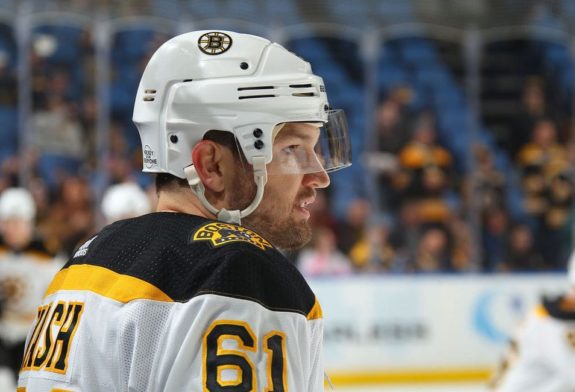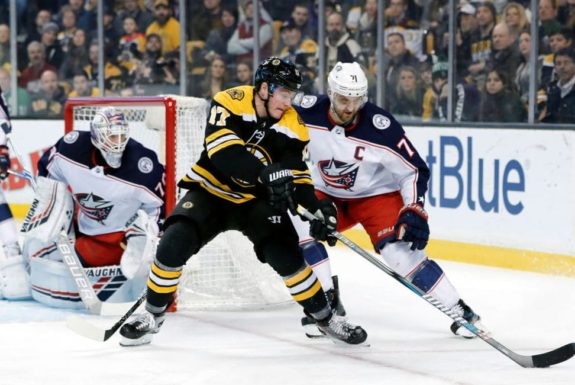A common narrative surrounding Rick Nash has always been his supposed inability to score in the postseason. It’s a somewhat fair point given the fact that he’s averaging 0.41 goals per game in his career in the regular season compared to 0.19 goals per game in the postseason.
What that fails to recognize, however, is the fact that Nash is so much more than just a goal-scorer. While finding the back of the net is a huge part of his game, the 33-year-old is the prototypical power forward who contributes to his team by throwing his weight around, using his size and reach to protect the puck and by playing responsibly in all three zones.

When looking at his first postseason game in Boston, it’s easy to look at his zero points in a 5-1 win over the Toronto Maple Leafs and assume that he was a non-factor in many ways. Anyone who watched the game, however, can attest to the fact that Nash had an excellent game despite missing the previous nearly a month of action due to a concussion.
Nash’s Impact Transcends Points
When looking at the final box score, the goals, assists and points categories may have all read “zero,” but that doesn’t account for his three shots, three hits or contributions at even strength and on the power play. When Nash was on the ice with David Krejci and Jake DeBrusk, he meant business.
Related: Bruins Acquire Rick Nash
Whether it was strong forechecking, hustles to backcheck, going to the dirty areas of the ice or anything in between, Nash was there. Creating offense despite not recording points is a distinct possibility in the NHL and it’s something Nash did very well in his return to action.
By game’s end, the veteran winger had played in 11:01 of even strength hockey and recorded a very impressive 73.65 Corsi For%. To put that in perspective, only Patrice Bergeron (82.14), Brad Marchand (81.48), and David Krejci and David Pastrnak (75) recorded higher Corsi For% in the game.

Seeing Nash play and judging Nash by his point totals are two entirely different things. The same could have been said about Patrice Bergeron for the majority of his career as well prior to the rest of the hockey world taking notice of his offensive contributions. Sometimes, there’s more than meets the eye and that rings true with Nash and his ability to make a huge impact on a game without even recording a point.
It isn’t often that a player can play such a huge role in a top-six forward capacity and not so much as collect one assist. Still, Nash managed to do so and it paid off in spaids as the Bruins took a 1-0 series lead against Toronto in dominant fashion.
Points Will Likely Come for Nash
Based off of what the Bruins were able to do against Toronto in their first postseason matchup and given how strong Nash was all game, it would be surprising to see him finish the postseason without finding some sort of payoff. Whether that payoff comes in goals or assists is yet to be seen but it’s likely coming and it’s something the rest of the league should be wary of if that is indeed the case.
The Bruins have shown all season long that they can produce offense by playing a well-rounded team-forward game. It’s something that has benefited them all season and has led to multiple players creating offense this season (11 players recorded over 10 goals including seven who recorded over 15 and three who recorded over 30).
Even when players slump offensively, their contributions in all other facets of the game are huge to the general game plan of the team.

That’s part of the reason that there was a lot of speculation about whether or not Bruins’ forward Ryan Donato would play or sit in the first game of the series. With Riley Nash absent due to the injury he suffered near the end of the season that required upwards of 40 stitches to repair, the spot was up for grabs.
Related: Boston Bruins Playoff Guide
The fit made sense, too, given Donato’s impressive showing at all three forward positions with five goals and nine points in 12 games while going 12 for 16 in the faceoff circle.
What the Bruins showed Thursday, however, was that a balanced lineup with responsible two-way players can lead to a hefty amount of offense regardless of who is in the lineup. Donato will undoubtedly get a chance to play at some point in the postseason which is entirely possible of Bruins’ forward Tommy Wingels is unable to play or is suspended for Game 2).
While he wasn’t a liability, Donato’s offensive instincts are better than his defensive instincts at this time (which is to be expected so early in his career).
For now, players like Rick Nash are a prime example that scoring points isn’t the end-all, be-all of offensive production and solid hockey play.